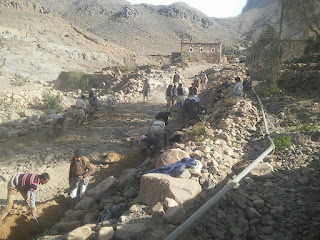After four years of war in Yemen
After
four years of conflict in Yemen with no end in sight, the war-torn country is
grappling with the worst outbreak ever recorded. This comes as the country
teeters on the brink of famine, suffering from soaring food prices, inflation
an
d fuel shortages.
For
nearly three years, the situation in Yemen has deteriorated, and the ongoing
war destroyed the sewage networks in Yemen and hospitals.
While
the risk of cholera continues, other deadly diseases such as diphtheria,
according to reports from several international organizations, Over 23 million
Yemeni are in need of humanitarian assistance, out of which 8 million are
facing famine-like conditions.
Recent blockades and
clashes deepened the already dire catastrophic humanitarian situation.
The situation is dire.
Yemen imports 90 percent of its food supply but, because of the conflict, all
of Yemen's sea ports have been closed, and goods can’t get in. That includes
the main port of Hodeida, which receives the majority of commercial commodities
and humanitarian aid, further preventing supplies from reaching the people who
need them most
Afflicted
with war that has plunged the country into what the United Nations has called
the worst humanitarian crisis since World War II, thousands of professionals in
Yemen have endured the war without an income in over a year
Mohamod
alsomy 29 years
“Life was already difficult when we were receiving the salaries because
it was barely enough to cover anything, but now that I don’t even receive
anything, we only live with the most basic necessities,”
“Imagine trying to live without a salary in a
country affected by war,” Ali said. “We have called on authorities several
times to give us our salaries, but it falls on deaf ears.”
Mahmoud
al-Azeri 40 years
We
lived in safety suddenly all that disappeared. Nearly a year and a half we
still suffer, no salaries, not enough food, no electricity and almost no water.
We do not know what is next.
Sara
ali 25 years
People
stand for hours to get bread to feed their hungry children, and the refugees
who ran from their burning houses to stay with their relatives search not for
safety, but for a roof to protect them from the sun and daily rain of bullets
and missiles.”
"Ordinary Yemenis now pay more than 30 percent of their income just to
get water in their houses, the highest rate in the world," said
Abdulkhaleq Alwan, a senior expert at Yemen's water and environment ministry.
The
price of water has risen so steeply because the price of diesel used to pump
water from the wells, and that of petrol to run the trucks, has gone through
the roof, Alwan said.
Besides
the threat of further starving the country and economic decimation, oil
officials say people are now dying because of fuel shortages.
“The price of all commodities, including
vegetables and other food products has increased,” said Anwar al-Ameri, the
spokesman for the Yemen Oil Company. “More and more people are dying because of
this, the lack of electricity and the lack of fuel to keep the hospitals
operating.”
“We sometimes use the
money we have for food to buy a candle,”AhmedSa’ad, 33, holding back tears.
“What can we do? God knows our situation.”
While
he says water is now available via a local charity, women and children have to
walk roughly a half-kilometer to ferry it back in buckets and jerry cans.
Sa’ad
also lost several family members, including his brother, in recent attacks that
left survivors homeless.
“The world’s indifference to the suffering of Yemeni civilians in this
conflict is shocking,” said Donatella Rovera, an Amnesty International crisis
response adviser who led the organization’s fact-finding mission to Yemen.
Politically, the war appears to be a battle
between Saudi Arabia, Iran, and other foreign powers, Sana’a residents say. But
they point out that while the power players may be locked in battle here - the
victims are all Yemeni

تعليقات
إرسال تعليق